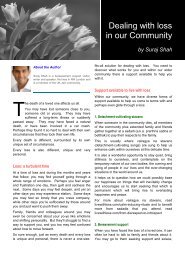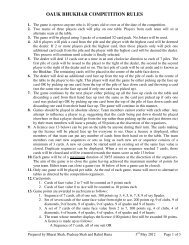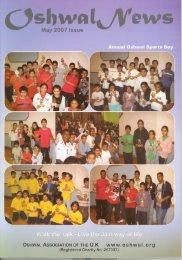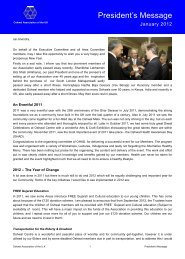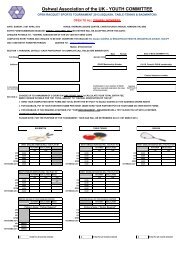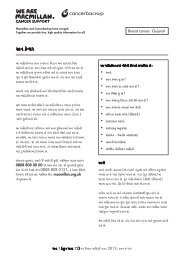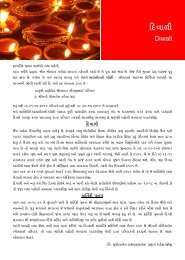June 2013 - Oshwal Centre
June 2013 - Oshwal Centre
June 2013 - Oshwal Centre
Create successful ePaper yourself
Turn your PDF publications into a flip-book with our unique Google optimized e-Paper software.
Samayik is one of the most important ritual practices of Jainism during which we<br />
try to come closer to our soul. During samayik, we sit down in one place for fortyeight<br />
minutes isolating ourselves from our daily household, social, business, or<br />
school activities. In this time, we read religious books, pray, worship, recite navkar<br />
mantra using mara (string of beads), or do meditation. Before starting samayik,<br />
we remove our regular clothes and wear simple, but clean white cotton clothes<br />
which are reserved for samayik. We do not wear silk clothes or any leather<br />
articles which involve much violence to bugs or animals. White is the symbol of<br />
purity and calmness and that reminds us that we should stay pure and calm.<br />
Some of the items we need during samayik are an asan, muhapati, rajoharan,<br />
ghadi, anupurvi, mara and religious books that will help us to carry out some<br />
religious activities. After cleaning the ground with rajoharan, the asan is spread to<br />
sit. A muhapati is used to cover the mouth. Some people tie it to cover their<br />
mouth, while others hold it in their hand and use it to cover their mouth while<br />
speaking. A muhapati prevents small organisms from entering the mouth. It also<br />
becomes a buffer so that force of our voice and the hot air from our mouths would<br />
not kill many air beings. A muhapati also prevents spit falling on books. It also<br />
serves as a reminder to us that we should control what we say to others. A<br />
rajoharan is a kind of broom made of fine cotton or woolen threads used to clean<br />
the floor, and also to keep away the bugs coming towards us, so that they do not<br />
get hurt. If, for some reason someone has to walk during the samayik then the<br />
rajoharan is used to wipe the floor so that no bugs are crushed. A ghadi is a type<br />
of hourglass which helps us to know the time has reached 48 minutes. During the<br />
samayik some people read religious books, while others may recite Navkar<br />
mantra with mara or with the help of anupurvi or some may do meditation.<br />
During samayik, we should not talk or think of anything that involves any level of<br />
violence. Therefore, before starting the samayik we should stop our business<br />
activities, family affairs, and other matters, so that we do not get disturbed. We<br />
should inform our friends and family members to leave us alone from these<br />
matters during this time. During the samayik we should not discuss, read or talk<br />
about sensual things, or things related to worldly matters. During the samayik, our<br />
movements also should be limited so that we can observe ahimsa (non-violence)<br />
more easily. We should select a quiet, isolated place so that we are not disturbed<br />
by events going on around us. Because of such a detached atmosphere, and<br />
since we do not get involved in any worldly things for 48 minutes of samayik, we<br />
are like sadhus who live a detached life all throughout their life. Thus, this practice<br />
gives us some glimpse of monkhood and leads us in that direction.<br />
Just as we have to be careful about how we drive to avoid an accident, or get a<br />
speeding ticket, in the same way we have to be careful that we do not run into any<br />
trouble while performing our samayik. If we are not careful we can violate samayik<br />
by our mental, verbal and physical activities.<br />
Though it may look difficult, it is not impossible to do samayik the right way.<br />
This way samayik helps us in preventing the accumulation of new karmas and the<br />
penance we do during samayik helps us to remove some of our accumulated<br />
karmas.<br />
Article by, Varsha Dilip Harania<br />
There are ten MENTAL<br />
violations:<br />
1) to be disrespectful<br />
2) to be greedy for fame<br />
3) to be greedy for gains<br />
4) to be proud<br />
5) to be in fear<br />
6) to expect the rewards<br />
7) to doubt the rewards<br />
8) to be in anger<br />
9) to be rude<br />
10) to despise.<br />
There are ten VERBAL<br />
violations:<br />
1) to use abusive words<br />
2) to use alarming words<br />
3) to say non-religious words<br />
4) to speak inadequately<br />
5) to use words to incite fights<br />
6) to gossip<br />
7) to make fun<br />
8) to pronounce improperly<br />
9) to use irrational words<br />
10) to use jargon.<br />
There are twelve PHYSICAL<br />
violations:<br />
1) to sit at an unsuitable place<br />
2) not to sit steady<br />
3) to walk every now and then<br />
4) doing homework<br />
5) to stretch the body<br />
6) to lean against a support<br />
7) being lazy<br />
8) cracking knuckles<br />
9) to clean body dirt<br />
10) to scratch body<br />
11) to make vulgar postures<br />
12) to sleep.<br />
<strong>Oshwal</strong> Youth Magazine of O.A.U.K. 13 <strong>June</strong> <strong>2013</strong> Edition





